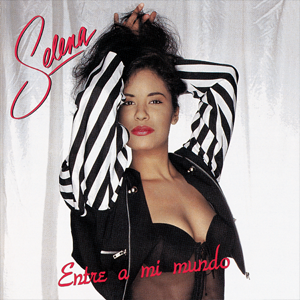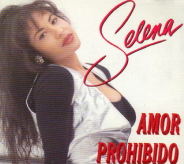Related Research Articles

Selena Quintanilla Pérez, known mononymously as Selena, was an American Tejano singer. Called the "Queen of Tejano music", her contributions to music and fashion made her one of the most celebrated Mexican-American entertainers of the late 20th century. In 2020, Billboard magazine put her in third place on their list of "Greatest Latino Artists of All Time", based on both Latin albums and Latin songs chart. Media outlets called her the "Tejano Madonna" for her clothing choices. She also ranks among the most influential Latin artists of all time and is credited for catapulting the Tejano genre into the mainstream market.

Amor Prohibido is the fourth studio album by American singer Selena, released on March 13, 1994, by EMI Latin. Having reached a core fan base, the label aimed to broaden her appeal with the next studio release. Finding it challenging to write a follow-up hit after "Como la Flor" (1992), Selena's brother A. B. Quintanilla enlisted the assistance from band members Ricky Vela and Pete Astudillo with writing the album's songs. The resulting album has a more mature sound featuring experimental production that blends diverse musical styles from ranchera to hip-hop music. Amor Prohibido is a Tejano cumbia album modernized with a synthesizer-rich delivery using a minimalist style that was quintessential in early 1990s Tejano music.

Entre a Mi Mundo is the third studio album by American singer Selena, released on May 6, 1992, by EMI Latin. The label endeavored to bolster Selena's popularity within the Latin music market in the United States with this release. A. B. Quintanilla sustained his role as the singer's producer and, in collaboration with Selena y Los Dinos members Pete Astudillo and Ricky Vela, composed tracks for the album. The ensuing recording encompassed an eclectic array of songs, attributable to the members' diverse backgrounds, which facilitated the modernization of the sundry genres they explored. Entre a Mi Mundo is a Tejano cumbia album that encapsulated Selena's quintessential sound, characterized by engaging tunes harmonized with her distinctive, plaintive vocals and a relaxed, danceable cumbia beat. The album incorporates musical inspirations from power pop, R&B, disco, rock, funk, and synthesized Tejano music.

Dreaming of You is the fifth and final studio album by American singer Selena. Released posthumously on July 18, 1995, by EMI Latin and EMI Records, it was an immediate commercial and critical success, debuting atop the United States Billboard 200—the first predominately Spanish-language album to do so. It sold 175,000 copies on its first day of release in the U.S.—a then-record for a female vocalist. With first week sales of 331,000 units, it became the second-highest first-week sales for a female musician since Nielsen Soundscan began monitoring album sales in 1991. Billboard magazine declared it a "historic" event, while Time said the recording elevated Selena's music to a wider audience. It won Album of the Year at the 1996 Tejano Music Awards and Female Pop Album of the Year at the 3rd annual Billboard Latin Music Awards.
American singer Selena released six studio albums, three live albums, three boxsets, one remix album, two soundtrack albums, and twenty compilation albums. Credited for elevating a music genre into the mainstream market, Selena remains the best-selling Tejano recording artist whose posthumous releases continue to outsell those of living musicians. Selena has sold 18 million units worldwide, making her one of the best-selling artists in Latin music. She was named the top-selling Latin artist of the 1990s decade by Billboard magazine.

Siempre Selena is the second posthumously released album by American singer Selena, released by EMI Latin on October 29, 1996. The album contained mostly unreleased recordings and remixes of previously released content. Songs on the album range from a 14-year-old Selena on "Soy Amiga" (1986) to the shelved Don Juan DeMarco (1995) soundtrack song "Siempre Hace Frio". Siempre Selena was a result of the impact of Selena's death in March 1995, where the singer's father and manager Abraham Quintanilla Jr. began receiving requests from fans of her music. Abraham rediscovered forgotten tapes of songs Selena recorded for various projects. Following her death, Abraham expressed how he wanted to keep the singer's legacy alive and that public knowledge of Selena was very important to him. Critical reception of Siempre Selena was mixed, with varying reviews suggesting that the album was more for Selena's fan base and found no particular track on the album to be of any interest, while others favored its diversity and remastered songs.

Anthology is the first box set by American singer Selena. It was released posthumously on April 7, 1998, through EMI Latin to commemorate the singer's works. The collection comprises 30 tracks, dispersed across three genre-themed discs: "Pop / English" showcases uptempo pop compositions, "Mariachi" highlights Mexican ballads featuring poignant narratives of heartache, and "Cumbia" presents danceable tropical rhythms. The album encompasses recordings from a 14-year-old Selena on her Alpha (1986) album to the posthumous "Disco Medley" (1997). With a limited number of unaltered tracks, Anthology predominantly features reworked and remastered musical arrangements, while preserving the singer's original vocals. Selena's death in March 1995 prompted an influx of requests from her admirers. The singer's father and manager, Abraham Quintanilla, expressed a desire to maintain his daughter's legacy through her music. However, Selena's family has faced criticism from both fans and the media, who accuse them of capitalizing on her death and commodifying her repertoire.

All My Hits: Todos Mis Éxitos Vol. 2 is a greatest hits album by American singer Selena and was released posthumously on February 29, 2000, through EMI Latin. In 1999, Selena persisted as EMI Latin's top-selling artist, surpassing the sales of living musicians with her releases. President of EMI Latin José Behar, who discovered the singer at the 1989 Tejano Music Awards, acknowledged the singer's contributions in establishing EMI Latin as "the house that Selena built". To commemorate the label's tenth anniversary, they released All My Hits: Todos Mis Éxitos in March 1999, achieving commercial success and prompting the announcement of a sequel. All My Hits: Todos Mis Éxitos Vol. 2 encompasses a diverse array of songs, spanning from tracks featured on Selena's Muñequito de Trapo (1987) to the posthumous 1997 club remix of "Enamorada de Ti" (1990). Subsequent to Selena's death, her father, Abraham Quintanilla, expressed his interest in persevering his daughter's memory through her works. Selena's family has faced criticism from both fans and media outlets for allegedly exploiting the singer and commodifying her death by commercializing her musical repertoire.

"No Me Queda Más" is a song by American singer Selena on her fourth studio album, Amor Prohibido. It was released as the third single from the album in October 1994 by EMI Latin. "No Me Queda Más" was written by Ricky Vela, and production was handled by Selena's brother A.B. Quintanilla. A downtempo mariachi and pop ballad, "No Me Queda Más" portrays the ranchera storyline of a woman in agony after the end of a relationship. Its lyrics express an unrequited love, the singer wishing the best for her former lover and his new partner.

"Bidi Bidi Bom Bom" is a song recorded by American Tejano singer, Selena. It was released as the second single from her fourth studio album, Amor Prohibido (1994). Originally written about a cheerful fish swimming freely in the ocean, the song's title is an onomatopoeic phrase suggesting the palpitating heartbeat of a person lovestruck by the object of their affection. "Bidi Bidi Bom Bom" was written by Selena and her backup vocalist and dancer Pete Astudillo.

"Amor Prohibido" is the title song of American Tejano singer Selena's fourth studio album of the same name (1994). Released as the lead single through EMI Latin on April 13, 1994, it was written by Selena, her brother and music producer A. B. Quintanilla, and her band's backup vocalist Pete Astudillo. "Amor Prohibido"'s lyrical themes have been analyzed by authors, musicologists, and journalists, who found them relevant to issues facing the LGBT community. A popular interpretation compares it to Romeo and Juliet.
Regional Mexican Albums is a genre-specific record chart published weekly by Billboard magazine in the United States. The chart was established in June 1985 and originally listed the top twenty-five best-selling albums of mariachi, tejano, norteño, and grupero, which are all sub genres of regional Mexican music. The genre is considered by musicologist as being "the biggest-selling Latin music genre in the United States", and represented the fastest ever growing Latin genre in the United States after tejano music entered the mainstream market during its 1990s golden age. Originally, Billboard based their methodology on sales surveys it sent out to record stores across the United States and by 1991 began monitoring point-of-sales compiled from Nielsen Soundscan. Musicologist and critics have since criticized the sales data compiled from Nielsen, finding that the company only provides sales from larger music chains than from small shops that specialized in Latin music—where the majority of Latin music sales are generated. The magazine decided to rank Latin music recordings in August 1970 under the title Hot Latin LPs, which only ranked the best-selling Latin albums in Los Angeles (Pop) and the East Coast (Salsa). Before the chart's inception, musicians' only chart success was the Texas Latin LPs section where regional Mexican music was more prominent. Beginning in November 1993, Billboard lowered the rankings from twenty-five to fifteen positions on its Latin genre-specific charts, while the Top Latin Albums expanded to fifty titles. From July 2001 until April 2005, the chart increased to twenty titles and then lowered back to fifteen titles. Since 2009, the Regional Mexican Albums chart list the top twenty best-selling albums determined by sales data compiled from Nielsen SoundScan.
Latin Pop Albums is a record chart published on Billboard magazine. It features Latin music information of the Pop music genre. Established in June 1985, this chart features only full-length albums and like all album charts on Billboard, is based on sales. The information is compiled by Nielsen SoundScan from a sample that represents more than 90% of the U.S. music retail market which includes not only music stores and the music departments at electronics and department stores, but also direct-to-consumer transactions and Internet sales. A limited array of verifiable sales from concert venues is also tabulated. On the week ending January 26, 2017, Billboard updated the methodology to compile the Latin Pop Albums chart into a multi-metric methodology to include track equivalent album units and streaming equivalent albums units.
American singer Selena released twenty-four official singles, seven promotional singles. Her career began as the lead vocalist of Los Dinos in 1980. Her albums with Los Dinos on indie labels failed to achieve any chart success. In 1987, her remake of Ritchie Valens' "La Bamba" peaked at number 19 on the United States Billboard Hot Latin Songs chart, her first entry. She signed with EMI Latin nine years later as a solo artist though her band continued to tour with her. Selena appeared on "Buenos Amigos" with Salvadoran singer Álvaro Torres. The track peaked at number one on the U.S. Hot Latin Songs chart in 1991, the singer's first number one song. Subsequent singles, "Baila Esta Cumbia" and "Como la Flor", became popular songs on Mexican radio, with "Como la Flor" launching the singer's career in that country. "Como la Flor" peaked at number six on the Hot Latin Songs chart, despite popular culture claims that it was the singer's first number one single. The track has charted on the U.S. Regional Mexican Digital Songs list since its inception in 2010 and remains the singer's signature number and most popular recording.
This is a list of notable events in Latin music that took place in 1995.
This is a list of notable events in Latin music that took place in 1993.
This is a list of notable events in Latin music that took place in 1996.
This is a list of notable events in Latin music that took place in 1994.
References
- ↑ Fernandez, Enrique (December 28, 1985). "Latin Notas" (PDF). Billboard: 70. Retrieved June 26, 2016.
- ↑ Trust, Gary. "Billboard Hot 100 Celebrates 20 Years of Nielsen Data". Billboard. Retrieved June 26, 2016.
- ↑ Pietroluongo, Silvio (2008). "How We Chart The Year". Billboard. Nielsen Business Media, Inc. Archived from the original on 2011-07-08. Retrieved 2010-03-30.
- ↑ "RIAA - Gold & Platinum Searchable Database". Recording Industry Association of America . Retrieved January 18, 2013.
- ↑ "Top Regional Albums (31 Aug 1996)". Billboard.com. 31 August 1996. Archived from the original on 31 March 2018. Retrieved 13 August 2015.
- ↑ "Top Regional Albums (7 Sep 1996)". Billboard.com. 7 September 1996. Retrieved 13 August 2015.
- ↑ "1990 The Year In Music" (PDF). Billboard. Nielsen Business Media, Inc.: YE-50 December 22, 1990. Retrieved June 26, 2016.
- ↑ "1992 The Year in Music" (PDF). Billboard. Nielsen Business Media, Inc.: YE-52 December 26, 1992. Retrieved June 26, 2016.
- ↑ "1993 The Year in Music" (PDF). Billboard. Nielsen Business Media, Inc.: YE-58 December 25, 1993. Retrieved June 26, 2016.
- ↑ "1994 The Year in Music". Billboard. Nielsen Business Media, Inc.: YE-82 December 24, 1994. Retrieved June 26, 2016.
- ↑ "1995 The Year in Music" (PDF). Billboard. Nielsen Business Media, Inc.: YE-66 December 23, 1995. Retrieved June 26, 2016.
- ↑ "1996 The Year in Music". Billboard. Nielsen Business Media, Inc. 108 (52): YE-66. December 28, 1996. Retrieved June 26, 2016.
- ↑ "1997 The Year in Music". Billboard. Nielsen Business Media, Inc. 109 (52): YE-58. December 27, 1997. Retrieved June 26, 2016.
- ↑ "1998 The Year in Music". Billboard. Nielsen Business Media, Inc. 110 (52): YE-71. December 26, 1998. Retrieved June 26, 2016.
- ↑ "1999 The Year in Music". Billboard. Nielsen Business Media, Inc. 111 (52): YE-80. December 25, 1999. Retrieved June 26, 2016.